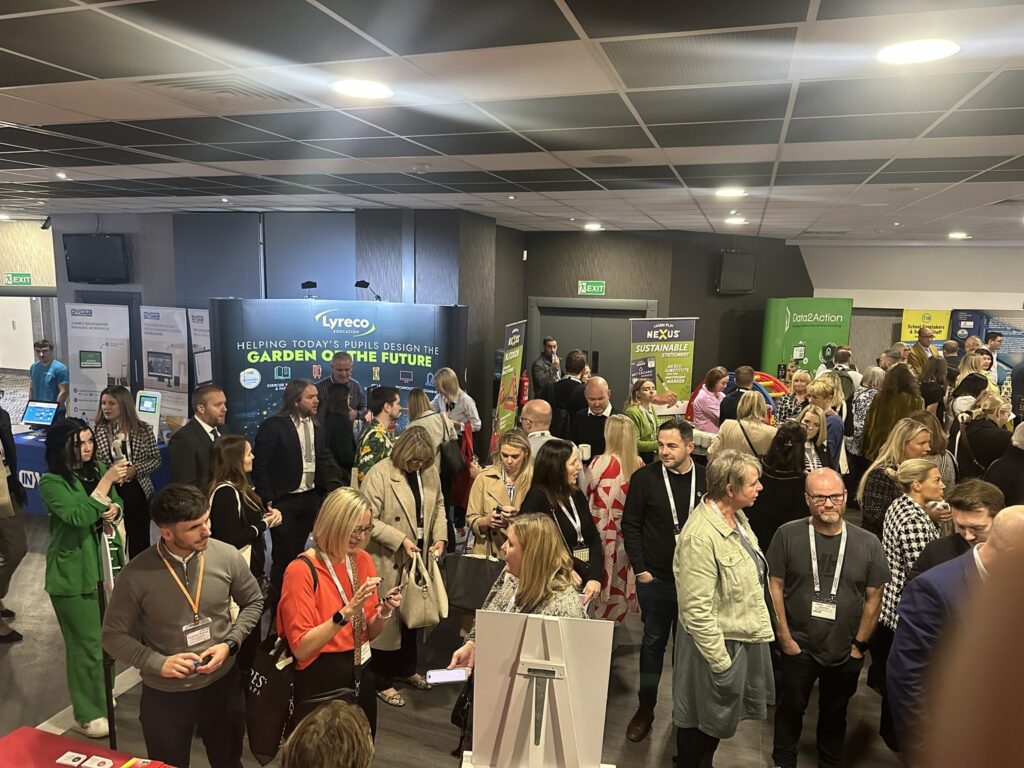Educating Westminster and influencing the direction of change: Key takeaways from Summit 2024
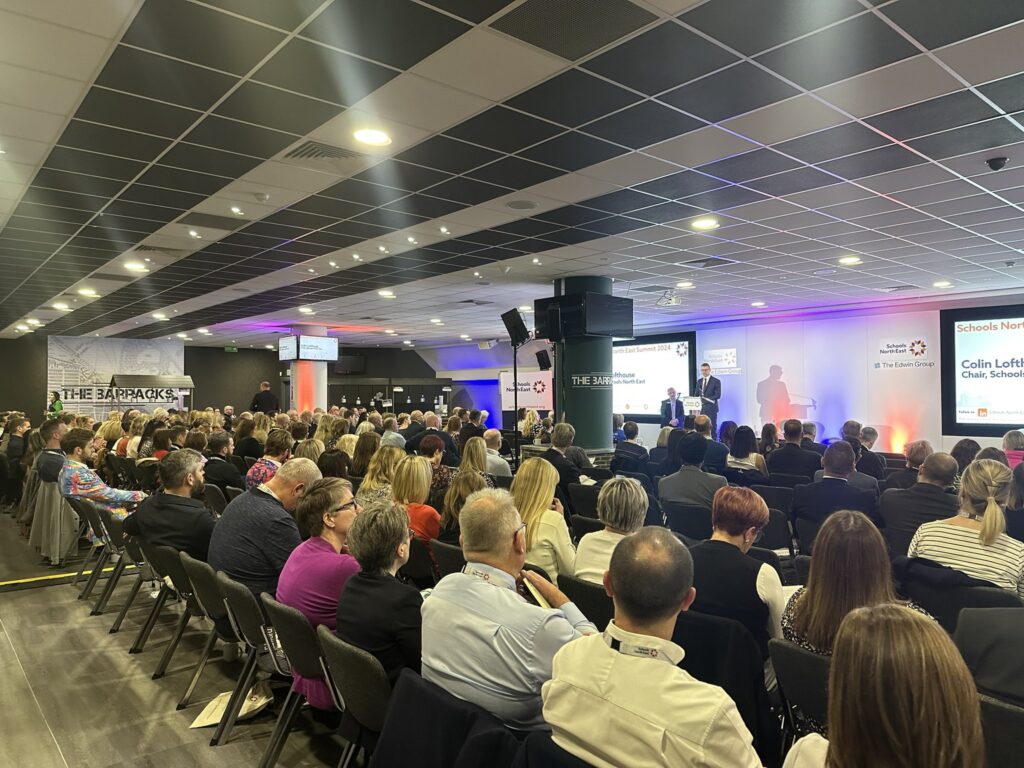
Key takeaways from Summit 2024. Yesterday, we held our annual Summit at Newcastle’s St James’ Park, and what a remarkable day it was. The event was a resounding success, uniting 500 passionate educators and leaders to discuss how the North East can influence national education policy and drive positive change.
This year’s theme, Educating Westminster – Influencing the Direction of Change, reflects the region’s desire to ensure that decisions made far from the North East are grounded in the realities of its schools. This remained the beating heart of the entire conference, reminding our brilliant school leaders that they must play a central role in shaping the policies that directly impact their schools and students.
Not only did the Summit give us the opportunity to welcome the new Minister for School Standards (Catherine McKinnell MP) and other influential colleagues from Department for Education, but it also offered a unique space to challenge existing policies, propose new ideas, and ensure that the lived experiences of our region’s educators are the force behind conversations on the future of education.
Chris Zarraga, Director of Schools North East, opened the event by welcoming attendees from across the region and beyond. “Your unwavering commitment to your schools, your students, and your communities is what drives this organisation, and it’s what makes our collective voice so powerful,” he said, addressing Head Teachers, Trust CEOs, senior school leaders, and colleagues from the Department for Education (DfE).
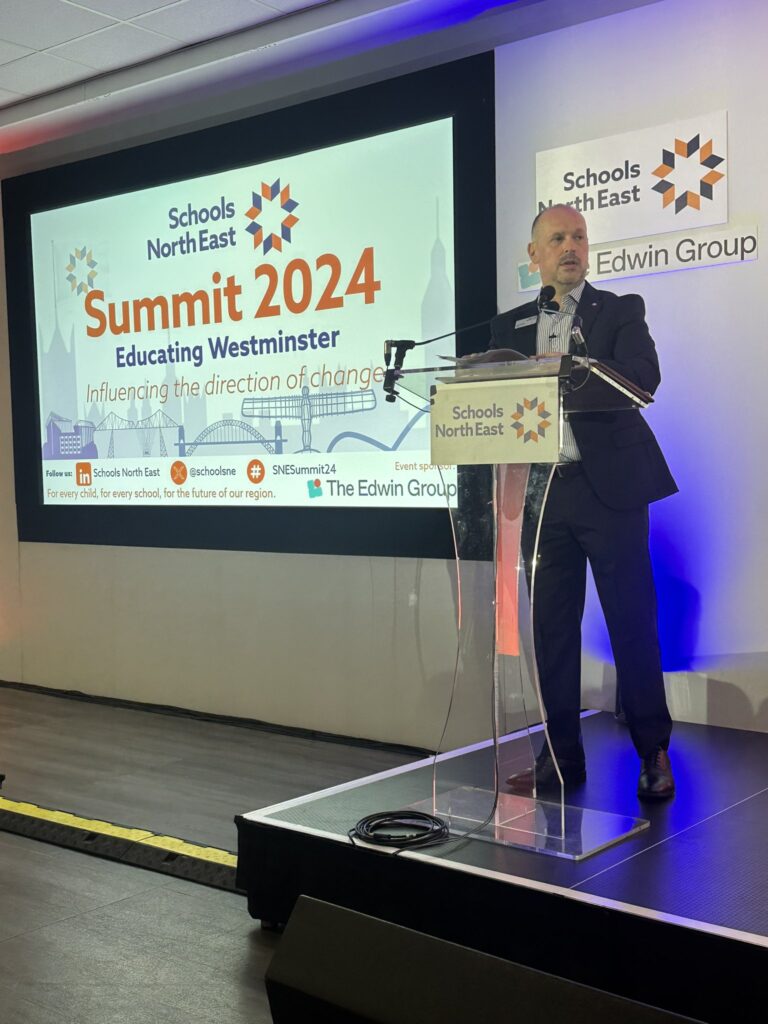
Chris highlighted the unique role of North East schools as not just places of learning, but as “lifelines for our communities.” He also underscored the significance of the Summit’s theme, given that this is the first new national government in nearly 15 years. “The decisions made by our new leaders and policymakers, based far from where we sit today, will have profound effects on the lives of our region’s young people. And we know that those decisions must be grounded in the real lessons and experiences of our region.”
He went on to remind attendees that the North East’s schools are “vital national strategic architecture,” urging Westminster to recognise and protect them as such.
Colin Lofthouse, Chair of Schools North East, followed with a similarly powerful message. “The Summit is always an inspiring opportunity to come together, reflect, and share,” he said. He pointed to the remarkable achievements of the North East’s school leaders and educators, noting how resilient and committed they are in the face of immense challenges.
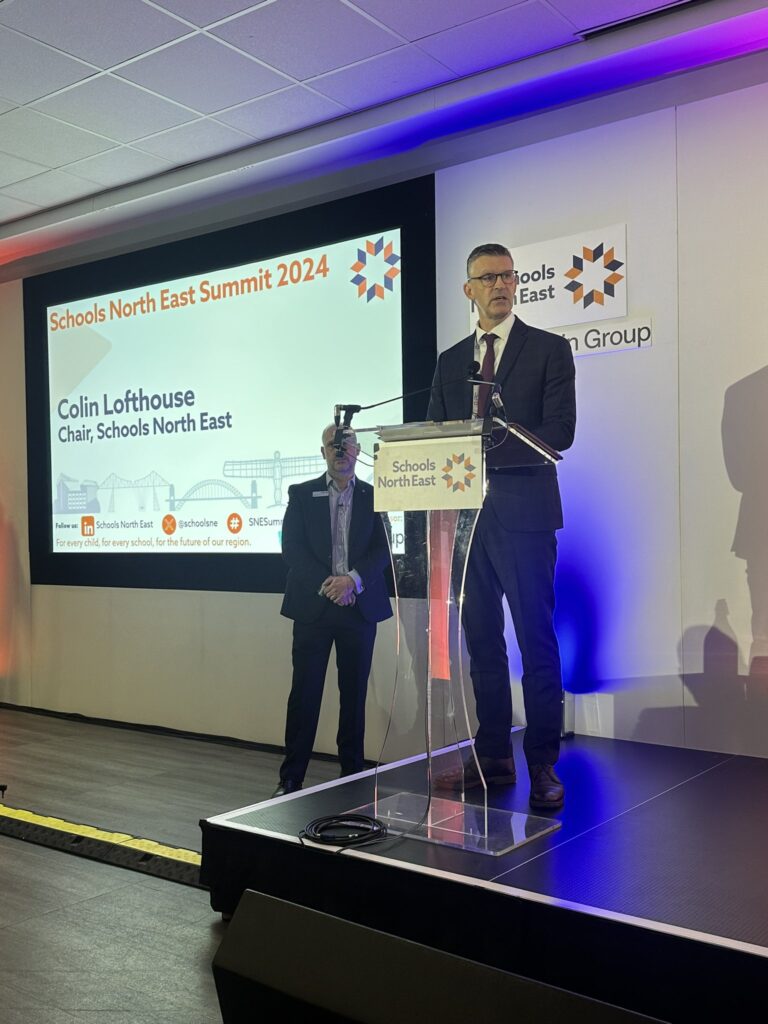
Colin was particularly pleased to acknowledge the North East’s growing influence in Westminster. “We now have two North East MPs as both Secretary of State for Education and Minister for School Standards,” he said. “Both hugely successful local women who were born and bred on Tyneside and educated in our schools—neither of them should need educating about what North East schools are really like.”
He welcomed the new Minister for School Standards, Catherine McKinnell MP, as a keynote speaker, noting her deep Newcastle roots. “This is an important chance for her to revisit us in her new role, listen to the professionals in the region, and make a real difference for the schools she represents.” He stressed that the stories shared at the Summit would give the Minister the evidence needed to educate those far removed from the North East and ensure better policy decisions.
Demanding a more nuanced, evidence-based narrative
Chris Zarraga added depth to the day’s discussions, using storytelling to emphasise the power of narrative in education. He argued that the current story told about North East schools is built on harmful myths. “The story of education in the North East has often been a poor one. Oversimplified, one-dimensional, a tale of ‘South good, North bad’,” Chris said. “The real story is much richer, more complex, and far more inspiring.”
He pointed to statistics that speak for themselves: 92% of North East schools are rated Good or Outstanding, the second-highest region in the country. “Our schools are places of extraordinary resilience. They serve on the front lines for some of the most disadvantaged communities in our country, stepping in as the ‘fourth emergency service’ when families face mental health crises, food shortages, and more,” Chris remarked.
The real challenge, Chris explained, is addressing the misconceptions that drive poor policymaking. He drew an analogy to the story of Eugene Schieffelin, who introduced starlings to Central Park in New York in 1890, causing unforeseen havoc. “Well-intended policies, when based on bad stories, can wreak havoc too. They distort reality, reinforce harmful biases, and create quick fixes that fail to address root problems,” he cautioned. “Real change comes from recognising the skill of those who face our region’s challenges head-on. The North East’s strength lies in the expertise of our school leaders, who should be trusted and supported to deliver meaningful change.”
In closing, Chris offered words of advice to the new Minister, urging her to base decisions on evidence, not cherry-picked data, and to ensure fair funding reaches the North East, where long-term disadvantage must be properly recognised and resourced. He stressed the importance of closing the attainment gap through targeted interventions and creating meaningful curriculum pathways that align with local economies.
“We look forward to collaborating with you to create solutions that truly support our schools,” Chris said to the Minister. “The decisions you make will have a profound impact on the future of North East education and on hundreds of thousands of young people across our region.”
The Summit left no doubt that the North East is ready to *educate Westminster* and ensure that the real story of its schools—one of courage, innovation, and dedication—drives national policy that transforms lives and strengthens communities.
Minister for School Standards’ first major public speech since being appointed
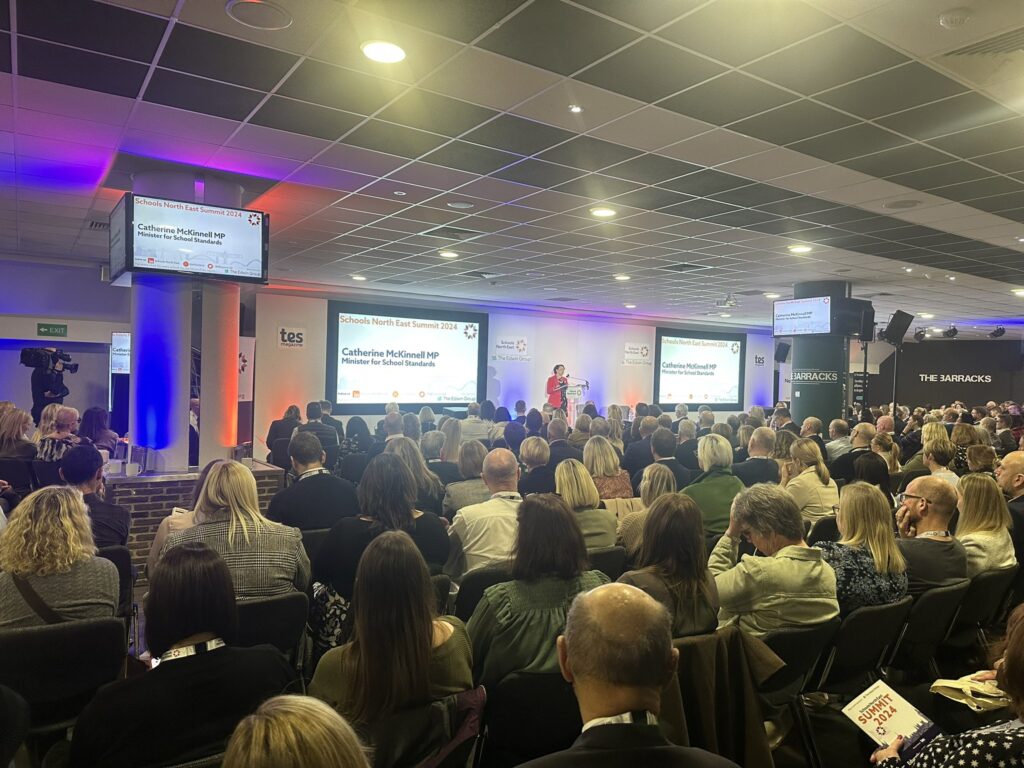
The presence of Catherine McKinnell MP, Minister for School Standards, was a significant opportunity to reconnect with the region’s educators. The North East has long been a symbol of resilience and community spirit, yet it has often been overlooked in national policy decisions.
The tale of ‘good schools’ versus ‘bad schools,’ often reduces success and failure to geography, which fails to capture the full complexity of the situation. In reality, 92 percent of the North East’s schools are rated Good or Outstanding, a testament to the hard work of our region’s educators who serve some of the most disadvantaged communities in the country. The negative narrative surrounding the region has consequences, deterring teachers and distorting policy.
With that in mind, it was great to have the new Schools Minister join us for her first major public address in this new role. Click here to read the details of her address.
How do we influence the direction of change with policy makers?
Throughout the conference, we revisited the importance of ‘Educating Westminster’ to achieve the support and recognition our region’s schools deserve. To close the day, we spent 45 minutes with a brilliant panel of colleagues and school leaders (Margaret Mulholland from ASCL, Jo Heaton CEO of Northern Lights Trust, Colin Lofthouse CEO SMART Trust, and Chi Sum TSE from the OECD) addressing the critical questions on everyone’s minds as we navigate the direction of change.

The main topics were: the underrepresentation of North East schools in policymaking, the incorrect negative narrative about North East school performance and their leaders, and the principles enshrined in the Schools North East ‘Manifesto for NE Education’ Schools North East – Manifesto for North East Education 2024 (Published) .
In terms of representation, the numbers speak for themselves: The Department for Education’s Curriculum and Assessment Review Panel has no representation from North East schools whatsoever. Of the 94 members on the seven external reference groups established by Ofsted in September, only two are from North East schools! This gross underrepresentation is particularly concerning given the scale of the challenges in the North East.
Another huge talking point is how policies must be evidence-based to avoid unintended consequences that can set back progress; and that can’t mean “the evidence I handpicked because it agrees with me”. We must ensure a culture of robust debate about what works, why it works, when it works, and where. Effective education policy must be grounded in the realities of the schools it serves.
Learning from the past to build a better, brighter future
In addition to Catherine McKinnell MP and our brilliant panel, we heard from more leaders and experts who each had some individual insight to share on the journey to educating Westminster and influencing the direction of change.
Dr Dan Jackson (Author of ‘The Northumbrians’) explored how the North East’s incredible history helped to make us England’s most distinctive region, and how learning from the achievements of the past might help us all – including those in parliament – to build a better future. We are truly a unique region. Westminster must take this into consideration.
The ‘real’ David Cameron addressed key points such as what ambition for our children currently looks like, and how we can challenge them and help to prepare them for an increasingly difficult future. There was music and laughter alongside some very thought-provoking opinions.
On the critical topic of SEND, Margaret Mulholland (SEND & Inclusion Policy Specialist) highlighted the most urgent challenges within the sector, exploring the changes we need to see and how we can implement them from classroom to Westminster.
Steve Rollett (Deputy CEO, CST) encouraged us to reflect on the current and future inspection reforms signalled by Ofsted and government, asking questions such as: how radical are the changes? How might the September 2024 changes impact on school inspections this year?
Chi Sum TSE (Specialist in Education Policy Evaluation, PISA, OECD) delved into the regional differences in student performance when measuring skills in reading, maths, and science. With artificial intelligence becoming an increasingly talked-about topic in education, it was particularly interesting to learn ChatGPT’s interpretation of data.
NatCen’s Gayle Munro (Director) and Samantha Spencer (Senior Researcher) explored key findings from some recent trials in early language and communication, maths and science. The findings translated a wide range of critical information, including how the young people were getting on at home and at school, how they got on with their peers, and what their expectations were for the future.
And it was a true honour to have Ziauddin Yousafzia (Education Activist and Co-Founder, Malala Fund) as our last keynote speaker of the day. As an educational entrepreneur and activist best known as the father of Nobel laureate Malala Yousafzai – who protested against the Tehrik-i-Taliban Pakistan opposition to the education rights of girls – it was inspiring to hear his life story.
Zauddin illustrated how, as a father, he transformed patriarchal norms, misogyny, and gender discrimination into beautiful family values of equality, respect, love, and freedom. As a teacher, he utilised his educational platform for positive social change by involving parents and students in reshaping the traditional and passive system of pedagogy into a robust and creative approach. We can certainly apply some of these values to our journey for change.
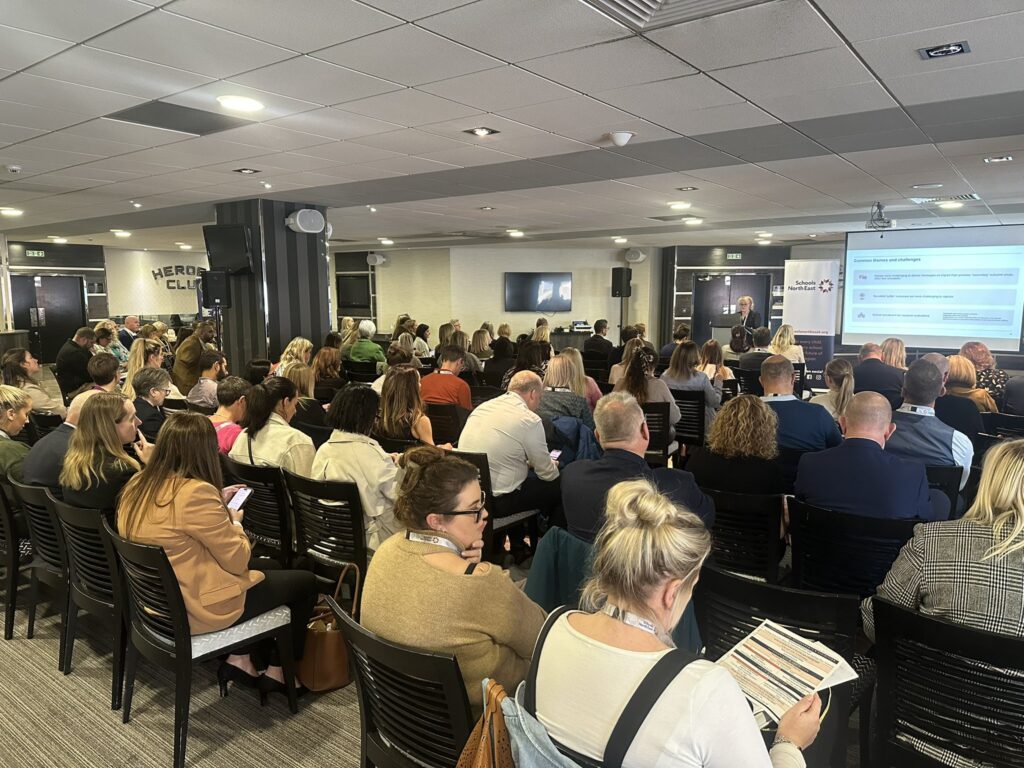
Paving the way for policy that’s fit for our amazing schools and everybody in them
Through keynote speeches, panel discussions, and breakout sessions, we were able to use the conference to explore a wide range of pressing issues, including funding inequalities, SEND reform, teacher recruitment and retention, and mental health in schools.
By fostering open and honest dialogue centred around the theme of EDUCATING WESTMINSTER, the Summit ensured that the insights from those on the frontline of North East education were heard loud and clear by those in Westminster.
The Summit has done an extraordinary job of paving the way for policy that’s fit for our amazing schools and everybody in them, but this is only the beginning. In an era of rapid political and social change, the fight will be ongoing, and that’s exactly why Schools North East exists.
